
Everyone knows the significance of mental health, yet men oftentimes struggle with knowing what to do, who to talk to, or what resources are at their disposal. Once a stigma marking the stoic male, mental health has evolved into an important discussion, free from shame. From coping with trauma to living with gratitude, a mindful dedication to emotional and psychological health is key to a more fulfilled, content life. Today, something as simple as mental health apps can be a great starting point for men who don’t know where to begin.
While mental health counselors, friends, family, and religious guides can help to achieve balance and an enlightened existence, there are manifold free resources for men to utilize. In a sea of digital options, however, these tools can take a while to sift through — unless, of course, you’re one of our readers. The following eight mental health apps are some of the best options that aggregate chats, resources, and other assets to help you realize optimal mental balance and tranquil equanimity.
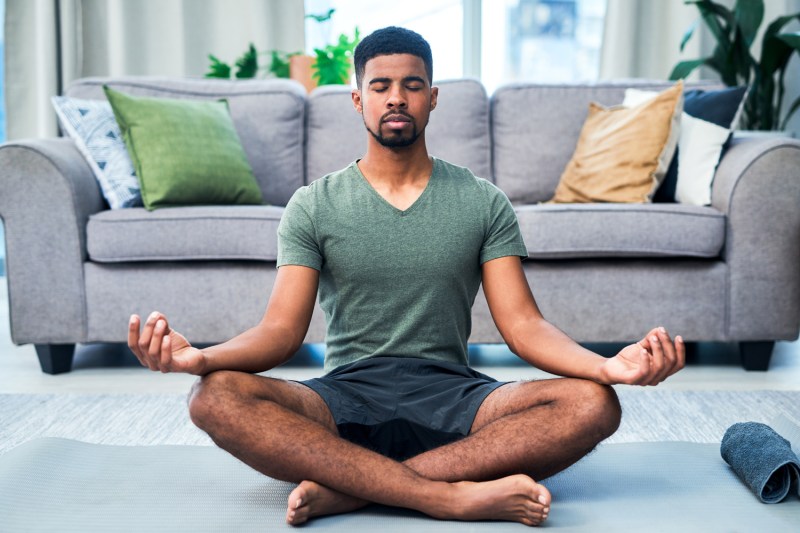
Types of mental health apps
Mental health apps cater to various specific needs, offering a range of features and tools. Here are a few types of mental health apps available:
- Meditation: These apps focus on mindfulness techniques, providing guided meditation and grounding exercises. Look for beginner-friendly options if you’re new to meditation.
- Coping skills: Some apps use games, activities, and online worksheets to help users develop essential life skills, including stress management and improved focus.
- Addiction: Sobriety apps are designed to support individuals in recovery or seeking sobriety by tracking progress and celebrating milestones.
- Anxiety and depression: Therapy apps offer the option to engage in talk therapy with licensed providers, either as a primary treatment or as a supplement to in-person therapy, to address symptoms of anxiety and depression.
- Sleep problems: Mental health apps can assist with sleep issues, such as insomnia and nightmares, through features like sleepscapes, guided visual imagery, bedtime stories for adults, soothing music, and nature sounds to facilitate better sleep.
By exploring the diverse range of mental health apps available, you can find the one that best aligns with your specific needs and goals.
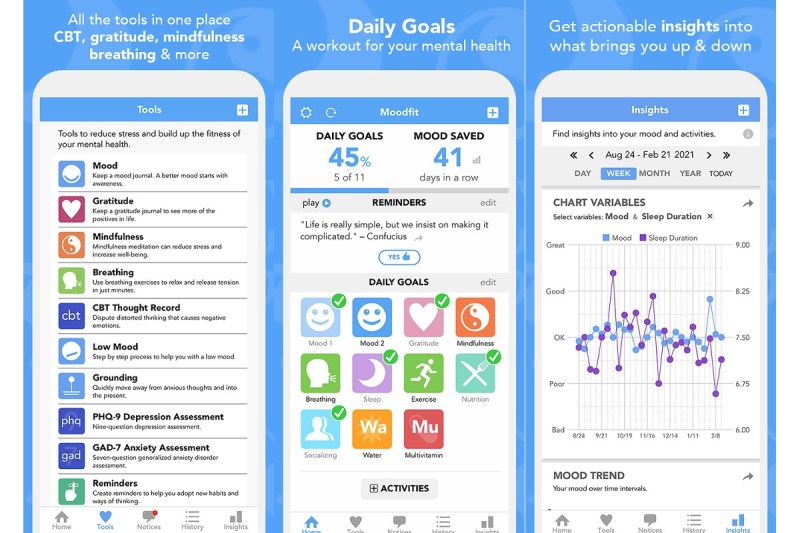
Best overall app — Moodfit
Serving its mission to improve your overall mood, Moodfit serves as a daily practice. Similar to how you build fitness habits for your body, Moodfit helps to build your mind-muscle. Whether you’re looking to better reflect your feelings or want to address anxiety, depression, or stress, Moodfit is designed to help improve your emotional well-being.
This app helps you track moods throughout each day with a rolling list that highlights lifestyle choices like diet and exercise, enables gratitude practice, and self-assesses your habits. Over time, you can learn how sleep, medication, and exercise affect your well-being. Moodfit also offers its own actionable insights and provides strategies for feeling better.
And if you’re experiencing health symptoms, there’s a questionnaire to help you determine their severity and audio can help you gain a better emotional understanding.
Free for basic use. There is a cost for premium features.

Best app for therapeutic tools — Sanvello
From stress relief to peer support and therapy advice, Sanvello delivers a range of mental health tools right from your phone. Even better, there’s a chance your health insurance plan may cover it.
Like Moodfit, you’ll be asked to track your mood daily with simple questions to help you label your emotions and identify mood patterns. Cognitive-behavioral therapy applications help to teach mindfulness practices that improve your mental health and stamina. Progress assessments help monitor your progress and set goals for the future.
Towards that end, Sanvello also helps you build confidence and build coping skills specific to stressful situations such as public speaking, test-taking, and morning dread. Guided journeys aim to provide you with a feeling of more control of your life. There’s even a community to connect and share anonymous advice, ask questions, or connect with others in similar situations. In a randomized study of 500 adults with mild to moderate anxiety and depression, Sanvello’s tools were shown to decrease symptoms with lasting effects post-ceasing the use of the app.
Sanvello is available on Android, Google Play, and iOS. The basic version is free and offers a premium version monthly subscription for full access to self-care content like guided journeys and meditations.

Most engaging, entertaining app — Happify
If you’re looking for engaging activities while boosting your mood, Happify is a solid option. The app is all about a science-based play that’s intended to reduce stress, build resilience, and overcome negative thoughts.
Developed by positive psychology experts and framed by evidence-based cognitive behavioral therapy interventions, Happify’s goal is to make you happier with a personalized track like coping better with stress, fueling career success, or building self-confidence.
Games only take a few minutes to complete, a nod toward creators’ assertion that “small slices of time can make big-time changes.” Evidence shows that Happify can work with a whopping 86% of people who used the app reporting feeling better about their lives in about two months.
Happify’s free version gets you some fun or opt-in for the premium plan.
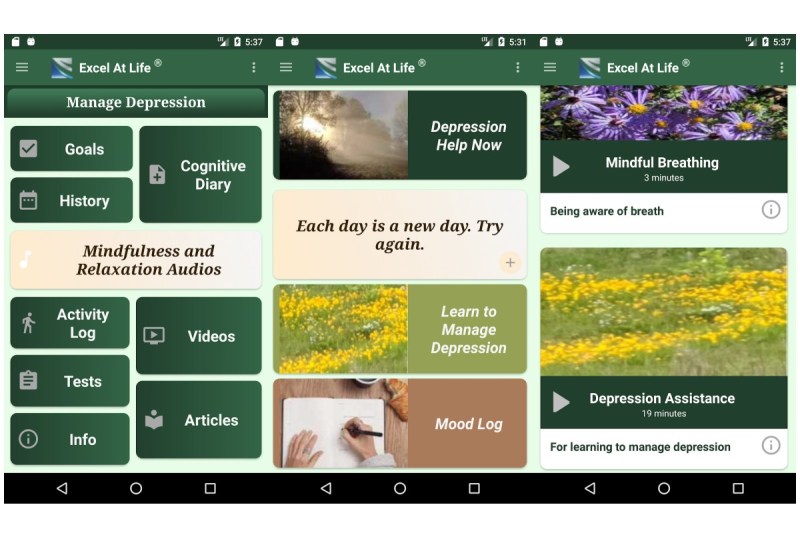
Best app for managing depression — Depression CBT Self-Help Guide
The app is based on cognitive behavioral therapy, which has been shown to be an effective treatment for depression. The Depression CBT Self-Help Guide provides education on depression and the best strategies for managing the symptoms.
The app encourages you to engage in self-care behaviors that can help build an improved mindset. Learn simple relaxation strategies for reducing stress, and discover how to reframe the thoughts that fuel depression.
Upon download, you complete a questionnaire to help identify the severity of your depression. The Depression CBT Self-Help Guide then provides basic information about depression and how to live in concert with it by addressing many common physical and mental symptoms of depression. If you want to feel better, confronting low energy, sleep disturbances, and other factors are critical to confront. Depression CBT provides you with suggestions, exercises, and a plan of attack.
Even better, the app is free to download and use.

Best app for BIPOC — Shine
Being BIPOC in the United States brings up all sorts of traumatic and additional obstacles to living your best life. The Shine app aims to face those factors head-on, helping to lift up BIPOC people by offering community support and tools that address BIPOC-specific mental health issues.
Shine’s focus is self-improvement through motivational messages, and an inclusive community so you can connect with other members at any time. Topics include stress, anxiety, burnout, acceptance, creativity, productivity, mindfulness, forgiveness, and work frustrations arising from the BIPOC experience. Science-backed app assets include meditations, a gratitude journal, and a daily mood tracker. Shine’s audio files are short, so you can listen to them in quick bursts aligned to address what help you need at the moment.
A premium subscription provides full access to audio talks and challenges, turns on saving favorite texts, and enables offline listening.
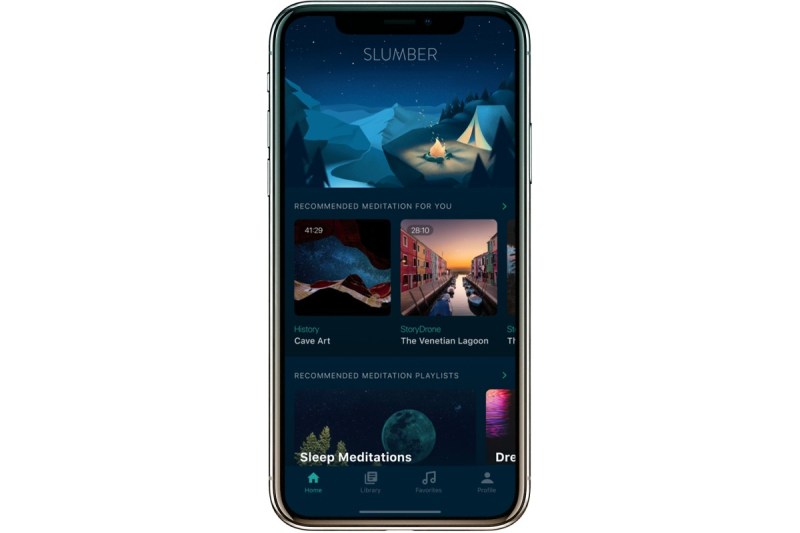
Best app for sleep — Slumber
True mental health can rarely be attained without the proper amount of sleep. Enter the Spotify of the sleep world, Slumber. The app offers to ease the day’s tension with shuteye-inducing meditations, stories, and music.
“We believe a great day starts with a good night’s sleep,” Slumber’s team states.
Who doesn’t like the idea of returning to childhood with a calming bedtime story to help you drift off? In addition, users will also find guided meditations, soundscapes, content for children, ASMR sounds, and customizable background noise to help create the perfect sleep environment.
Slumber also gives options to organize and search content by type, narrator, length, mark favorites, and more. It’s essentially an audio player that’s simple to configure with a large variety of quality content to find something to soothe stressed days. You can loop tracks and delay/fade-out endings to fall asleep before silence takes over.
You can find Slumber on Android and iOS free for over 10 episodes and get the premium package for an annual fee.
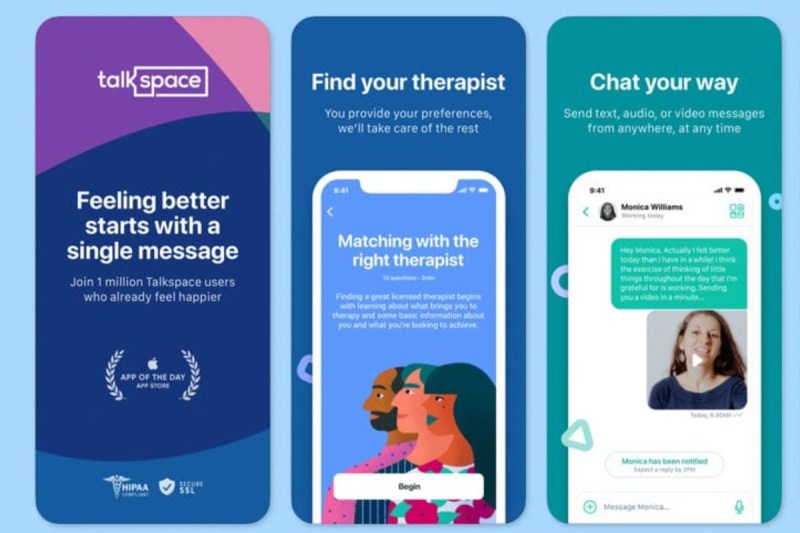
Best app for talk therapy — Talkspace
For more traditional therapy, Talkspace connects you with a licensed mental health professional for therapy via a digital device. Post completing an online assessment and choosing a plan, Talkspace connects you to a licensed mental health professional to work through issues like stress, anxiety, bad habits, and more. These are no mere rookie pros either. All Talkspace therapists have over 3,000 hours of clinical experience, with training to provide online therapy.
Users can choose from therapists with specialized training in cognitive behavioral therapy, existential-humanistic approaches, dialectical behavioral therapy, psychodynamic, and mindfulness.
Subscriptions offer an unlimited connection with text, video, and audio messages with responses coming in one to two times per day, five days per week. All conversations transcend devices, and Talkspace uses bank-grade encryption to keep your dialogue safe and confidential.
On iOS and Android, Talkspace offers a one-week free trial, and your subscription starts.
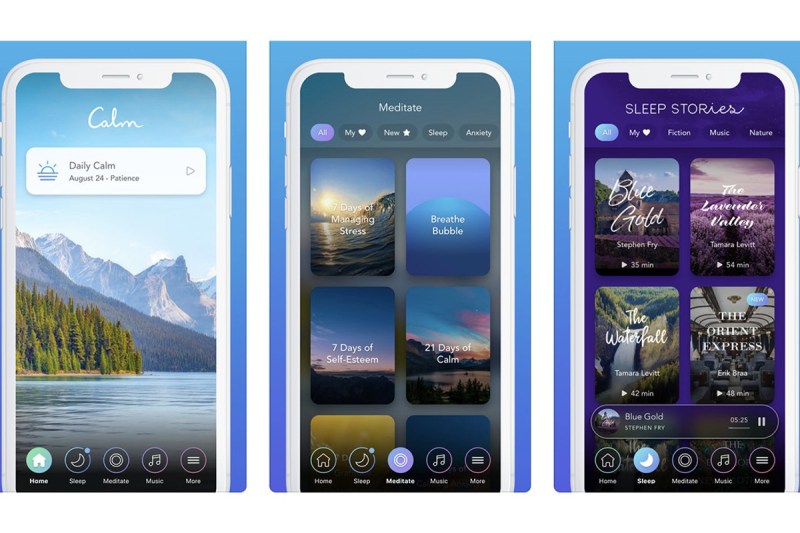
Best app for meditation — Calm
Calm is one of the more well-known chill apps, promoted by none other than King LeBron James and supported by the soothing sound of Matthew McConaughey and other celebrities.
Calm offers calming meditation, music, and sleep stories for people of all ages. The app makes meditation more accessible with a number of audio classes and programs to help get better sleep, relax with breathing exercises, and connect to the self with mindful movements. There is also a variety of relaxing sounds and music to provide a soothing setting for meditation and/or sleep.
Geared towards beginners as well as experienced meditators, Calm provides easy user navigation in addition to loads of helpful information on how to connect and destress through mindful actions. Segments range from three minutes to an hour to suit busy schedules.
The app offers a seven-day free trial, before committing a monthly or annual fee.

Balance is a download away
For guys, just being able to talk to someone about mental health and their emotional well-being can be a challenge. Luckily, mental health apps can be a wonderful start for those who want to improve their overall balance, as well as their health.



